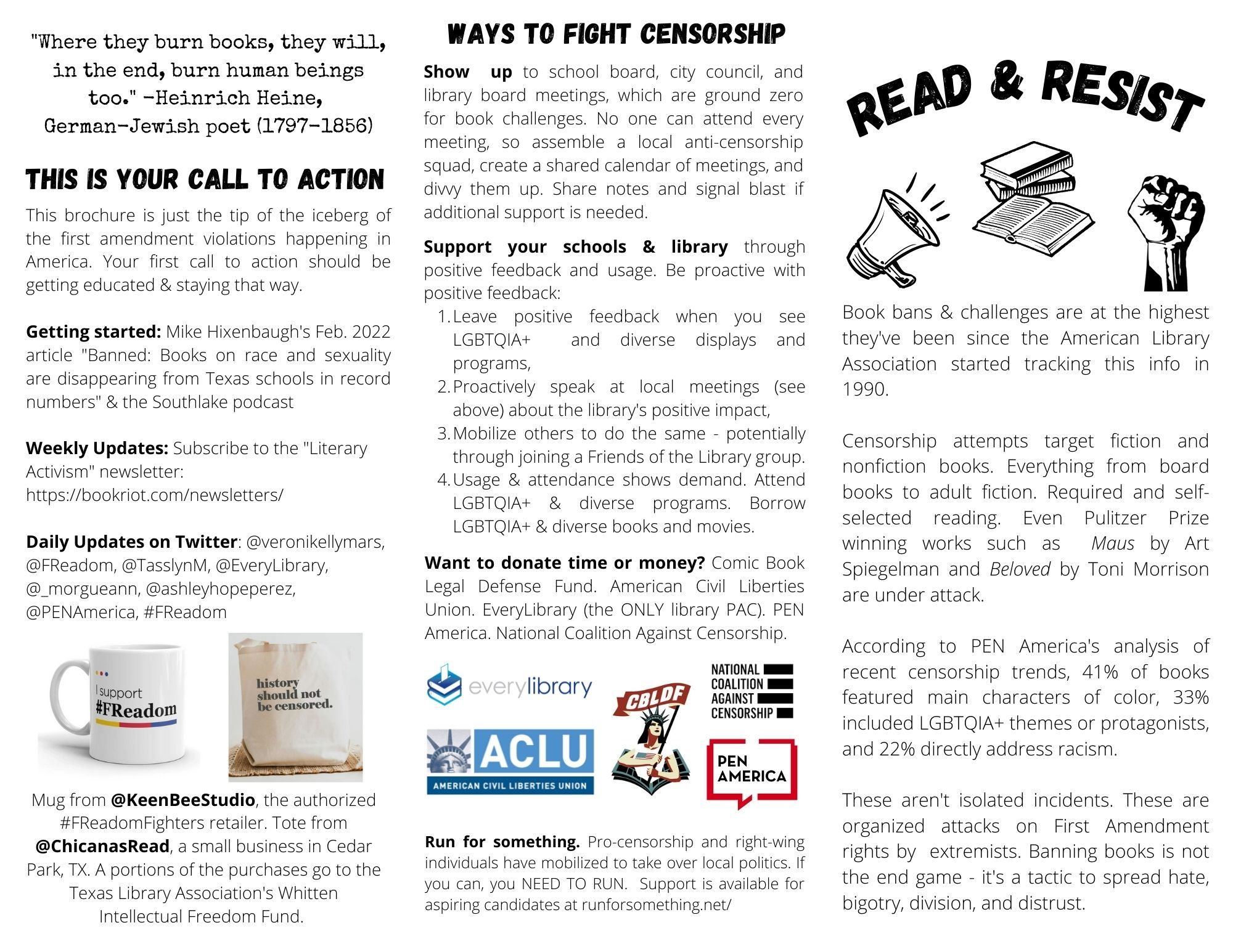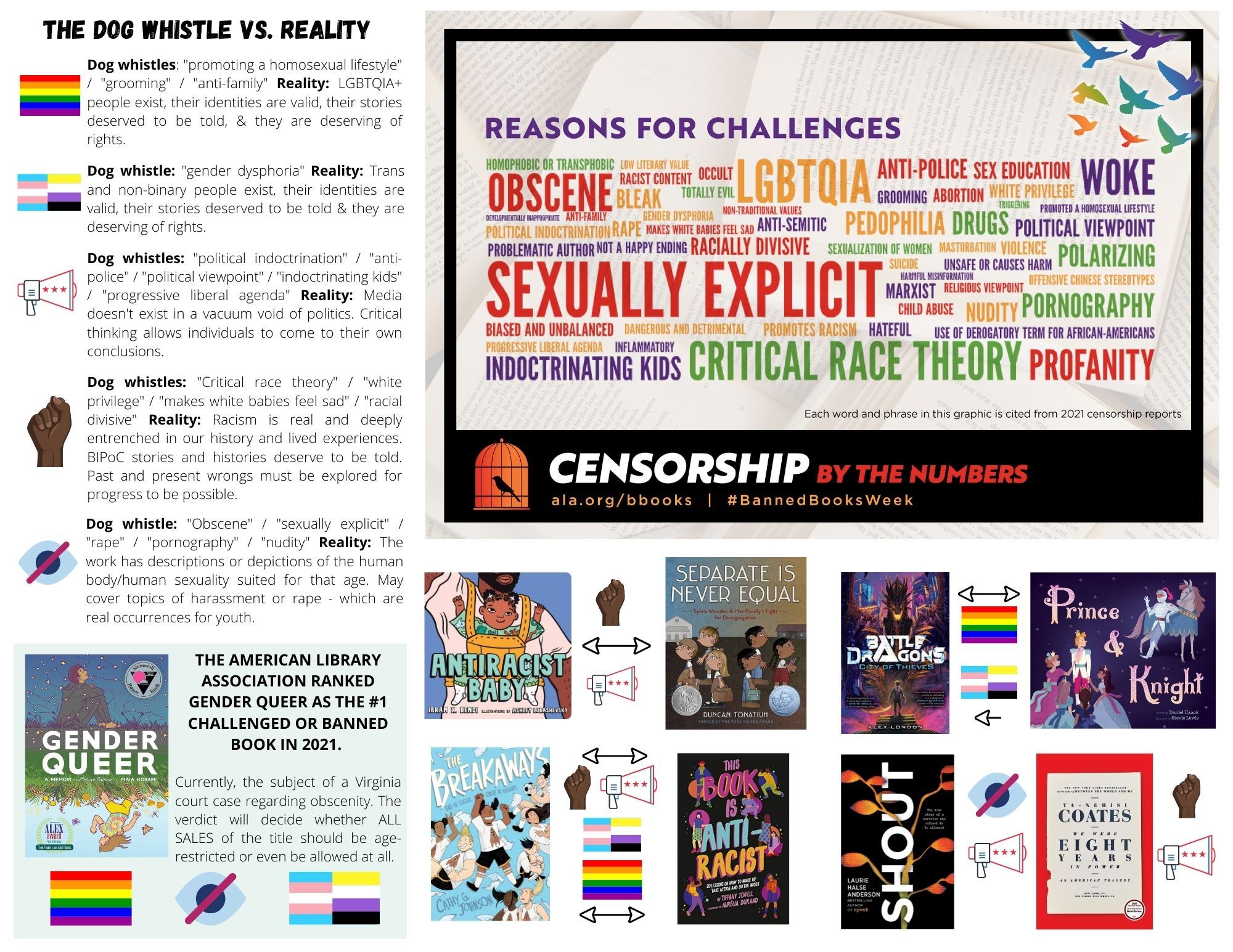Whether you’re in public schools or libraries or aren’t but support your local public institutions, one thing you can do right now to prepare for the fall and its inevitable wave of “parental rights” discourse and book challenges is get ahead of the misinformation. By openly addressing what has been happening over the last year and setting the record straight, you become the transparent organization that these groups are desperately demanding (even when they then are mad when it happens exactly as they demanded).
Build a guide to the current climate on your website, your social media, and affiliated groups to challenge the narrative being pushed by Moms For Liberty, No Left Turn, and others. Be upfront about the claims being made against libraries and schools in a broad way, then focus it on your local institutions.
Here’s a stellar example.
The Forest Hills Public Schools (Michigan) has been subject to a local group’s demands to things like “removing CRT” from the curriculum and “focusing on fundamentals.” They’ve been especially intent on highlighting the so-called Critical Race Theory being taught in the schools, beginning their quest for information via FOIAs last spring. The school board meetings have also become a space for right-wing political rallies.
A Political Action Committee in Forest Hills — developed and run by parents in the district — has stepped forward to right these claims through their group SupportFHPS. Included on their website is a thorough guide to all of the claims being made about education right now, both nationally and locally, with links to credible sources about why such claims are wrong and why they’re being made. It is a handy, easy to use guide that is accessible and understandable to people who are not staying on top of all of this news — which is impossible! — and it is a vital tool for passing along and ensuring that everyone has the same correct information at hand. What makes this guide especially good is that it’s usable to people inside the community specifically, as well as broadly applicable to those outside it.
This guide, simply called “Resources Against False Narratives and Misinformation,” offers definitions for the words being tossed at public institutions right now, as well as links to sources that better explain how these words and the information being spread across social media by right-wing groups is being twisted. The introduction to this guide is outstanding and one worth replicating to fit your community:
In most cases, the topics raised by attackers follow a national narrative that ties back to the effort to paint public or “government” schools as “failing” to rally greater community support for active private school voucher petitions that pull billions of dollars of Michigan’s public-school funding from our kids.
In fact, Michigan and specifically Forest Hills are “ground zero” for a monumental court case that soon decides whether families can use public funds or pre-tax dollars for private, religious institutions that are known to discriminate against applicants (See Hile v. Michigan). Public education supporters hope to keep public funding reserved for the 90% of school-aged students who rely on Michigan’s public schools, which welcome all kids.
Between this court case and the HEAVILY funded petition effort to pass vouchers, it’s no surprise that this “noise” against our schools will likely continue through the hearing of this case in spring 2022, the run of the voucher petition signature collection this summer, and the November 2022 mid-term elections.
Providing clarity and correcting misinformation are important parts of what we do at Support FHPS. We exist to help protect the integrity of our district. Find below articles that provide helpful context and a potential response to misinformation you hear or see, whether online or at district business meetings.
Imagine how much more productive our administrators could be if the community re-focused on truly relevant, local issues that we can discuss and collaborate through together.
While this effort is part of a group of concerned citizens in the community, this kind of advocacy and information sharing isn’t limited to those outside public institutions. In fact, more public libraries and schools should be doing this kind of thing themselves.
Take the example from Cherokee County School District in Georgia. In this case, the district’s communications team put together a helpful and transparent “true or false” website highlighting claims circulating within the community. Here are some examples:
I saw a post on social media about pornography being in CCSD high schools … is this real?
No. Please see the longer post below that clearly explains the false claims being made about pornography and CCSD. Additionally, social media posts now being circulated by School Board candidates and supporters falsely imply that an illustrated version of the acclaimed 1985 novel “The Handmaid’s Tale” is in all CCSD high schools. The 1985 novel, which is NOT illustrated, is in CCSD high school media centers for optional check-out by high school students (both Amazon and Lexile rate the book as appropriate for ages 14-18). The 2019 illustrated version, as pictured above, is available in only one CCSD high school media center (River Ridge High School); it is noteworthy to point out that this book has not yet been checked out by anyone. Neither the 1985 novel version, which has no illustrations, nor the 2019 illustrated version have been the subject of any book challenges filed by any CCSD parents or any other Cherokee County citizens.
Elaborating further on the challenges received by the district:
So far this year, CCSD has received challenges to 14 books, two of which are not in any CCSD schools. The challenges were made by a total of seven citizens; of those, four are not CCSD parents. The committee, which was doubled in size and split into two committees to allow for two books to be reviewed at the same time, has reviewed more than half of these books already; the remainder are scheduled to be completed by the end of the school year. One of the challenges has resulted in a book being removed from general circulation in high school media centers to instead be available only with a counselor referral and parent permission. None of the challengers have filed any appeal. (A chart of this year’s book challenges and the review status is online here and will be regularly updated; here is a 26-year history of challenged materials for perspective.)
Misinformation also is being circulated about a specific book that a member of the public read from at the School Board’s March 17, 2022 meeting that the speaker described as “pornography” and “illegal.” The book, “Homegoing” by Yaa Gyasi, is only available in high school media centers for optional check-out by students. It is not pornography nor is it illegal; it is a critically acclaimed book about slavery. The book is nationally recommended for high school students who hope to pass Advanced Placement (AP) English exams to earn college credit. It is not required reading to pass any CCSD classes. The speaker, who has not filed a challenge to any books, additionally submitted a list of 225 books to the School Board, via email on March 16, 2022, that she believes should be removed from CCSD schools; similar lists are being circulated nationally by political and special interest groups, but it is important to note that the majority of these books (123 of the 225) are not available in any CCSD schools.
This site is clear, easy to follow, and quickly dismantles the rumors being spread about the school district. These rumors are what float through the various right-wing groups and make their way onto fake news sites, adding even more fuel to the misinformation fire. In addition to talking about what’s happening locally, the district offers insight into what and how book challenges are happening nation-wide, providing verified information for those who are looking to find the truth.
If you’re in a position to do something like this, consider it a necessity for the upcoming school year. Link to non-political websites and information to answer questions, and know that doing this will provide you an opportunity to keep your community informed. It is not political to be this transparent, and in fact, it will save time, energy, and money to make this information readily accessible and updated — something that right-wing groups continue to demand (see: taxpayer money).
Have not experienced anything like this in your community? You’re lucky, and you could do a tremendous service by creating something like this, too. Be open about how you haven’t been challenged, but provide resources for those wanting more information. Remember that the truth is often behind a paywall, whereas rumors and fake news are free and abundant. Putting this information on a website for your educational institution gives it authority. Librarians have a great opportunity here, too, to develop LibGuides and other resources providing this kind of information. It not only empowers you, but it gives tools to your community to step in and speak about what’s really happening with the resources to back it up.
You could also do something similar to Morgan @_morgueann on Twitter/Instagram and create a helpful brochure.


Call to Action
For more ways to take action against censorship, use this toolkit for how to fight book bans and challenges, as well as this guide to identifying fake news. Then learn how and why you may want to use FOIA to uncover book challenges.
Not already signed up for our free biweekly (as in, every other week) newsletter on literary activism? Sign up today.
Book Censorship News: July 15, 2022
- No link, since the news happened before it could be covered for this roundup, but District 200 in Wheaton, Illinois, voted to retain Gender Queer on shelves.
- Meanwhile in Barrington, Illinois, they’re still debating Gender Queer’s place on school library shelves.
- 47 books have been challenged and are under review in Fauquier County schools (North Carolina). Thanks, Moms For Liberty. This article links to a sign up to volunteer website as the place where these folks are doing the work, rather than to the site where they’re doing the book reviews.
- Vinton, Iowa’s public library is closed until they figure out how to retain a staff. This comes after book challenges and an outcry over LGBTQ+ staff members. Yes, staff members.
- The ACLU is now officially involved in demanding answers for the removal of nearly 2 dozen books from Nampa, Idaho, schools.
- “”I’m not okay with them opening a book in the public school library, in an elementary school, and finding pornography. I don’t know how anyone can be opposed to that, but that’s why I’m here. That’s why I’m supporting the removal of these books,” Villarreal detailed. “It’s not to control. It’s not to be extreme. It’s to protect the hearts and minds of children so they’re not groomed.”” In Corpus Christi, Texas, there’s a new extremist parent group.
- In Coventry, Connecticut, a group of parents wanted to burn a display of LGBTQ+ books last month. Burn. A. Display. Of. Books.
- This is an odd story. In Broward County, Florida, the school donated 100+ books to a local museum, all of LGBTQ+ authors and/or content. Why? Even the museum director is wondering if this is related to the “Don’t Say Gay” bill, rather than the district’s claims of needing to make space.
- In Delmer, New York, there’s been controversy over a donation to the schools of queer books by the school board.
- “”I see why the parents are really outraged,” said Dorothy Clay, a former candidate for Abilene City Council. “They do not want to take their children to the library to gain valuable valuable knowledge and come upon sexually explicit material. Because once you plant these dangerous seeds in the mind of a child, it just grows and grows and grows out of control, and then they’re sexually addicted to pornography.”” This was in response to Abilene Public Library (TX) drafting a new policy stating parents are responsible for their children while in the library. Isn’t…that exactly parental rights? (To be clear, this policy is standard for public libraries and a good thing, but folks are mad they can’t have books sequestered). Let’s Talk About It is hardly going to send readers down a road of pornography addiction.
- While this lawsuit over books in Sarasota, Florida, is being called nutty, it is really setting the groundwork for what this coming school year will entail: lawsuits galore for schools, wasting a lot of time and money. It’s the perfect way for right-wing folks to kill public education.
- See Williamson County, Tennessee, where the school is facing a lawsuit over breaking the state’s law over not teaching critical race theory.
- This is a link to an excerpt of a paywalled story (you can click through to read at the source) but in Brevard County, Florida, schools, teachers will not be allowed to have classroom libraries this fall.
- Southlake-Carroll schools in Texas now are adding to their policies that decisions made on book challenges will hold for ten years. A banned book, for example, will be banned for 10 years. That is two and a half times the length of a sitting board’s tenure and for most students, the length of their entire educational career in the district.
- “Representing a group called “Madison Parents for Freedom” parent Rylon Thompson raised specific objections over a book called “There’s a Boy in the Girls’ Bathroom,” written by Louis Sachar. Turning to visitors and guests, Thompson asked, “Do any of you think it is appropriate for a girl in the third grade to be reading about a boy in the girls’ bathroom?”” This is a 35 year old book this individual is complaining about in Madison county schools, Mississippi.
- The challenge — and retention of — the book Patience and Esther at Dickinson County library (Michigan) has now led to a number of individuals complaining about other graphic novels in the public library. No action is being taken since there’s yet to be a formal complaint.
- In Independence, Kansas, the fight continues over a nonbinary character being the reason a book about cats fighting robots is not allowed on school shelves. You can’t make this up.
- 5 LGBTQ+ books about being challenged at the Sanibel Public Library in Florida. Why? They were on a Pride display.
- “Dixon business owner Brett Nicklaus, who helped found the Sauk Valley Freedom Fighters and recently lost the Republican bid for state senate against Win Stoller for the 37th District, urged for the books not only be removed but burned as well.” This is the Dixon Public Library in Illinois.
Lastly, I recommend reading this thread, start to finish. This new group went from 7,000 followers on Twitter at the time of thread to over 40K in three weeks. It is building much like Moms For has, and it gives the illusion of LGBTQ+ folks being against queer books. Alejandra does an outstanding job of unmasking Gays Against Groomers.
Also In This Story Stream
- Protect Yourself Now: Book Censorship News, July 8, 2022
- How To Directly Impact Democracy: Book Censorship News, July 1, 2022
- Librarian Vandalizes 2 Public Libraries, Spray Painting “Groomers”: Book Censorship News, June 24, 2022
- “Once the Books Start Coming Off the Shelves, We’ll See You In Court.”: Book Censorship News, June 17, 2022
- How Moms For Liberty’s Book Ratings System Enters Schools: Book Censorship News, June 10, 2022
- The Misinformation Age: Book Censorship News, June 3, 2022
- Business As Usual: Book Censorship News, May 27, 2022
- You Need To Talk About The Sex Parts in Banned Books: Book Censorship News, May 20, 2022
- The School Board Project, Round One: Book Censorship News, May 13, 2022
